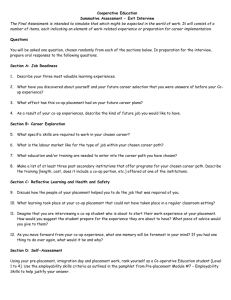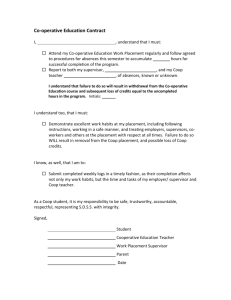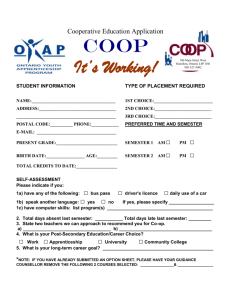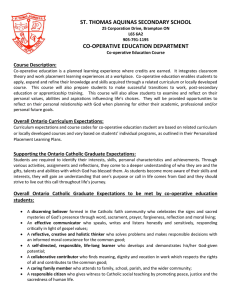Guelph Collegiate Vocational Institute Department: Co-operative Education Upper Grand District School Board
advertisement
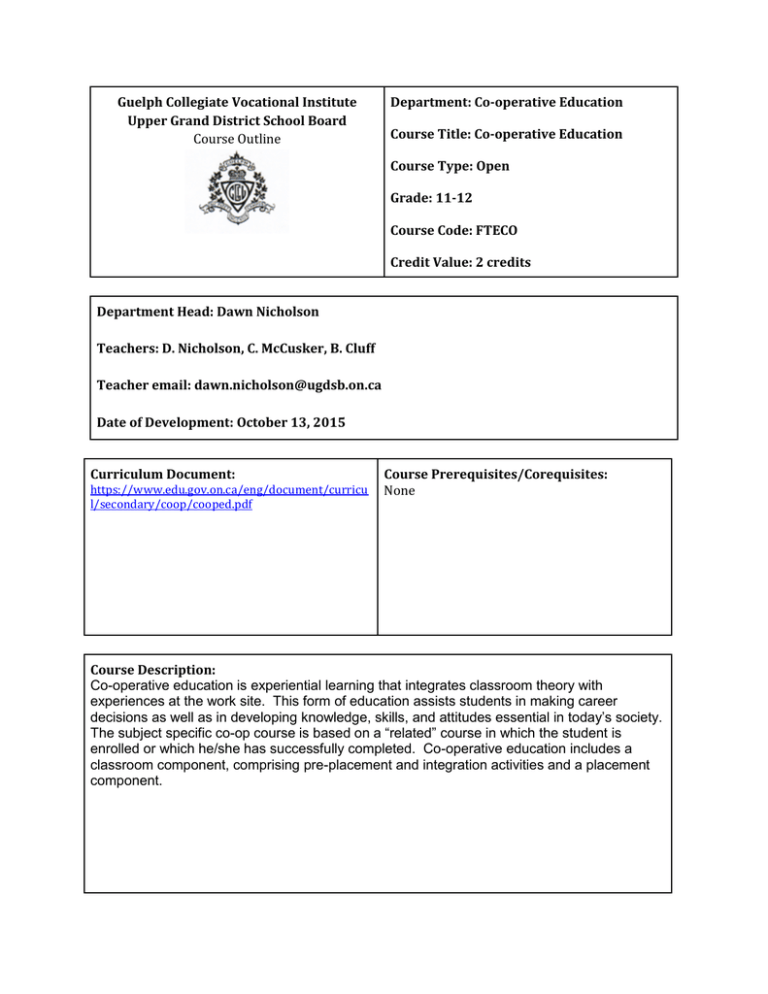
Guelph Collegiate Vocational Institute Upper Grand District School Board Course Outline Department: Co-operative Education Course Title: Co-operative Education Course Type: Open Grade: 11-12 Course Code: FTECO Credit Value: 2 credits Department Head: Dawn Nicholson Teachers: D. Nicholson, C. McCusker, B. Cluff Teacher email: dawn.nicholson@ugdsb.on.ca Date of Development: October 13, 2015 Curriculum Document: https://www.edu.gov.on.ca/eng/document/curricu l/secondary/coop/cooped.pdf Course Prerequisites/Corequisites: None Course Description: Co-operative education is experiential learning that integrates classroom theory with experiences at the work site. This form of education assists students in making career decisions as well as in developing knowledge, skills, and attitudes essential in today’s society. The subject specific co-op course is based on a “related” course in which the student is enrolled or which he/she has successfully completed. Co-operative education includes a classroom component, comprising pre-placement and integration activities and a placement component. Term Work (70% of the final mark) Unit Title, Big Ideas, and Unit Culminating Tasks Pre-Placement/Integration (40%) Understand and participate in the job search process (resumes, cover letters, interview skills) – Job Readiness Assignment Understand how to work safely – Health & Safety Assignment Reflect on work experiences to help transition from high school to job and career – Reflections (oral or written) Share the coop experience with the school community and provide information about pathways to that career – Co-op Career Fair Job Performance (30%) Meet challenging work/school responsibilities and learn by doing Performance appraisals by the employer/monitoring visits by the teacher Culminating Tasks/Exams (30% or the final mark) Course Culminating Task/Exams and Description Job Skills Demonstration (15%) – the Job Skills Demo is a demonstration of skills and knowledge that a student delivers at their placement. This is a chance for students to show their teacher a skill or knowledge that have learned at their placement. Exit Interview (15%) – the Exit Interview is an oral reflection with your teacher and a chance to reflect on what a student has learned from their placement, the impact this experience had had on them and their plans for the future. Based on the range of students’ learning needs, a selection from the strategies listed below may be utilized. Refer to list of teaching and assessment strategies. Teaching Strategies: Differentiated instruction – each co-op placement is unique and therefore instruction is tailored to each student’s needs. Blended e-learning – the course uses the tools of an e-learning website to teach and support learning in face-to-face classes. Technology is used extensively to facilitate the coursework and recording placement work hours. Assessment and evaluation strategies: Formative assessment – students regularly receive feedback on both their performance at work and their performance in course work, allowing them to progress and improve. Summative assessment – students complete a range of assessments, from a formal performance appraisal to written or oral reflections, presentations, and the completion of job search documents. Textbooks/Learning Resource Materials E-learning website Fees for Learning Materials/Activities Learning Materials/Activities Transportation to placement Required personal protective equipment (PPE) eg. Workboots Cost Student responsibility - variable Student responsibility - variable Please refer to the GCVI Student Handbook for our school policies on: ● academic integrity ● late and missed assignments
